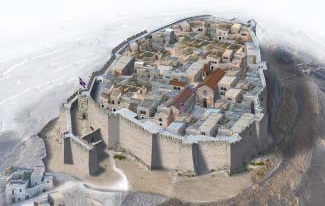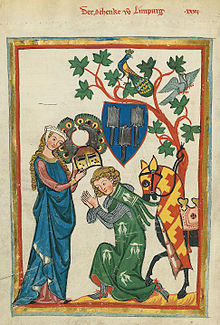Imperialisium wrote:Meeting of Uri, Unterwalden, and Schwyz April, 1018AD The letter from the von Radnitz had been received by both the ruling families of Uri and Unterwalden, and naturally a reciprocal letter was returned in a matter of days. The von Ulrichs of Uri and the von Unterwalden's were the most powerful magnates in both respective cantons. Naturally, they would be the ones to represent the various landlords in both cantons. For both cantons were less centrally governed than Schwyz. Instead, Uri and Unterwalden were divided up into various baronies. With the Von Ulrichs and Unterwaldens holding the titles of Freiherr. Each holding the majority of the land and holding the most Knights in fief to them, naturally. As such, they arrived in Stan at the head of their own coteries of Knights and attendants. Each one bringing a dozen horse and an equal number of attendant servants for the meeting.
Stan like much of Switzerland was a small village surrounded by teaming, tall, snow-capped mountains. Thick dark forests or rolling hills with sheep and cattle grazing upon them. A few fishermen boats plied the waters near the village. Fishing in the lakes and ponds for the cold water fish that made such places their abode. Both parties waited in the center of the village. The village alderman having a table and chairs rushed out while both parties dismounted and waited.

Various smaller families with their personal retinue of knights and men-at-arms were lined up before the walls of the Von Radnitz castle. The banners of several feudal lords along with their personal coat of arms were fluttering due to the wind(there were around 10 flags as when Weilheim counted.) There were 100 knights of the Von Radnitz family,200 men-at-arms and their 200 personal guards were all present. The total number of men gathered were over 1000 men, among them, were over 300 knights, around 500 men-at-arms, and the 200 guards. The spirits and the morale of the gathered men were undoubtedly high. This was the realms military's backbone and the Von Radnitz family had mustered over half of them as a show of force towards the other representatives of Uri and Unterwalden. While they might assume that Schwyz wanted to talk about making a trade deal or something else along that route, what Weilheim had set out to accomplish was much greater. He was seeking the Unifications of the Forest Cantons either by making an alliance or annexing Uri and Unterwalden.
"My Lord, I have counted and your army has gathered and we are ready to march," yelled the marshal of the Schwyz force, Fredrich Von Werner, who for this occasion donned his old armor. "My Lord, the numbers are accounted for and none of your vassals are absent, even your brothers had mustered the guards of their estates." The various smaller lords seeing and hearing no reply broke into idle chatter. The nobles of the realm saw this as a chance to create more allies and to stay off the Von Radnitz's strike list. Fredrich instead of socializing with the other lords instead turned around and inspected the troops and gave a speech towards the knights about winning land and glory.
Weilheim stepped out after Fredrich had finished his speech. He himself was dressed in a suit of ring mail (Chain-mail) Hauberk, mail coif, a nasal helm, and a mail aventail. "My Vassals, I apologize for appearing at such a late time, we shall set out for Stan in ten minutes. As many of you know or have heard, my father, Heinrich Von Radnitz had united the various houses of Schwyz under the banner of the Von Radnitz family. Many of your houses have suffered and had lost land to my family. Today will be the day that you shall regain your honor, for this is the start of a greater Schwyz. I have called for a meeting among our fellow forest cantons of Uri and Unterwalden. What they don't know is that I, no rather WE will either force them to join us by force or by peace. The choice is theirs, but we all know that the peaceful option will be beneficial for us both." Weilheim paused as he walked over towards the assembled lords. "By uniting the cantons we shall double our land, population, and increase our military might. My goal and the goal that I want my descendants to strive for is the unification of every Canton of Switzerland. Only this way will we truly make our name known to the powers of the World. As a measly state with a total population of 80,000 do you think that the Byzantine to the East, The Franks to our west and the various Italian duchies and city-states have heard of us? No, they have not, but if we expand and conquer, they will learn of us and the amount of power we wield." When he finished, Weilheim mounted his stallion and his men followed, this would mark either the rise or fall of the Canton of Schwyz.
The ride to Stan was a merry thing. The lords talked among themselves while their knights and men-at-arms were talking to men of equal standing in the other baronies of the Canton. Weilheim himself, however, decided not to talk and rather appreciate the beauty of their surroundings. Men that grew up in the hills and valleys of Switzerland might find it unappealing to the eye and would rather be in a big city like Prague or Constantinople, to outsiders this would be considered not beautiful, but pleasing. The mountains, hills, and forests of Switzerland had never lost their beauty nor appeal in the eyes of Weilheim. After staring at the scenery for a decent amount of time he turned towards his marshal and uncle-like figure, "Fredrich, do you believe that these mountains, hills, and forests were a gift from God to us to ease our suffering? Is Switzerland a place of great beauty and strength? Our people fought the Romans, and while we lost we still gained the gifts of writing and literature. Do you, Fredrich truly believe that our people are blessed with a land as great as this?"
"My Lord, I believe in everything that you said. I also believe that your family shall be written in history as the unifier of Switzerland. Your nephew I believe unlike your useless brothers should be taught in the ways of war, jurisprudence, and theology and not sent off to some far off empire or noble house to learn useless things. Emperor Justinian the first grew up as a peasant and yet he became an Emperor and he also regained much of the former lands of the Empire!" Fredrich replied. Weilheim agreed with Fredrich for he himself wanted his nephew to learn from the troops and the talented men that he hired in his court instead of some useless noble.
When he finally arrived at the village of Stans, he noticed that both the Von Ulrichs and the Von Unterwaldens had already arrived. Seeing the size of their respective retinues Weilheim felt as this was a blessing by the gods. He had assumed that they like himself would bring a sizeable force to demonstrate their power, but as it seems they hadn't thought of that option. Before riding into the village itself he took with him his marshal Fredrich, and several of his larger vassals. The of rest of his band was stationed outside of the village. The villagers themselves were shocked and surprised to see the number of knights that had gathered. They were peasants, and unlike the canton of Schwyz, Uri and Unterwalden weren't as heavily centralized. Weilheim firmly seated himself before addressing the other two men. "Good day gentlemen, as I had written to you earlier this year, I have come to discuss with about many things. My nephew has been born so I will no longer have to worry about an heir, but that isn't the point gentlemen. I have come here to ask you whether your willing to join the Canton of Schwyz. This is not an alliance per se as you will have to answer to the Canton of Schwyz but with this, I am willing to centralize your personal cantons. You will join Schwyz, but you won't lose your current positions. In simple terms gentlemen like the holy roman empire, the Von Radnitz family would be the "Emperors" but your families and land will still belong to you and you will continue to rule like before. This will beneficial as this will strengthen our economy and military, by several times."






















